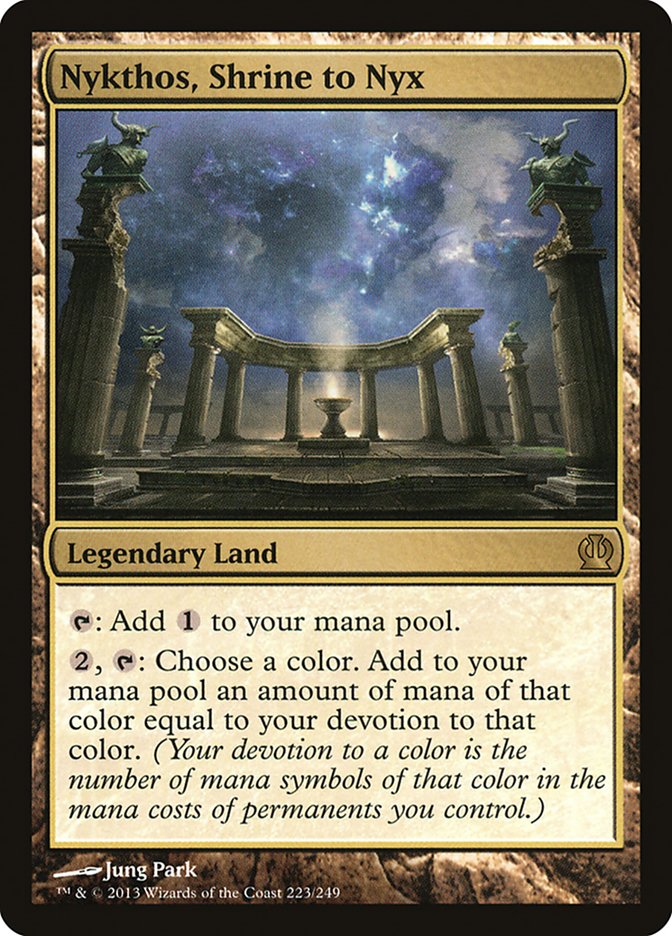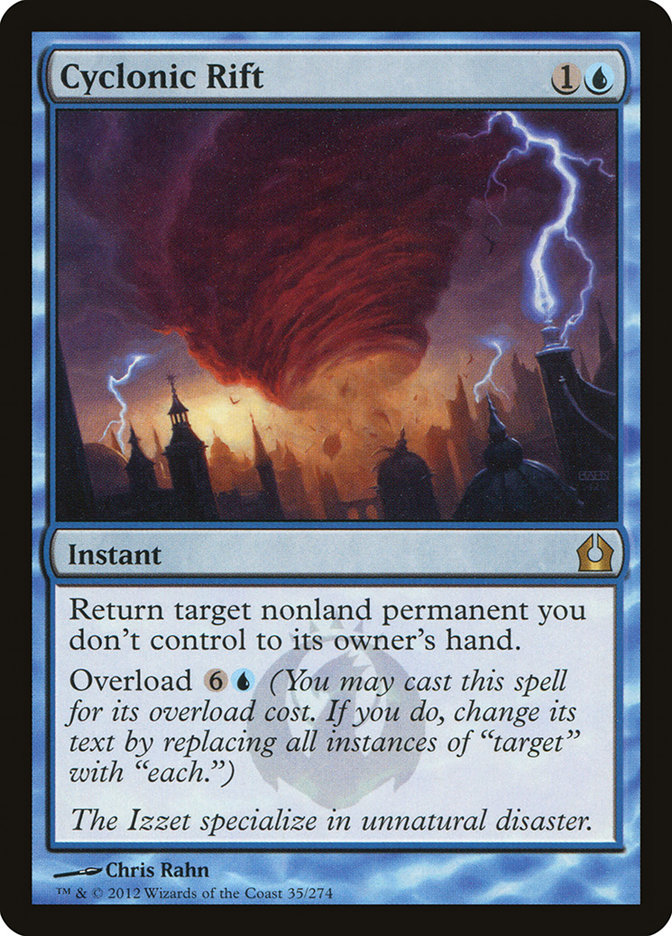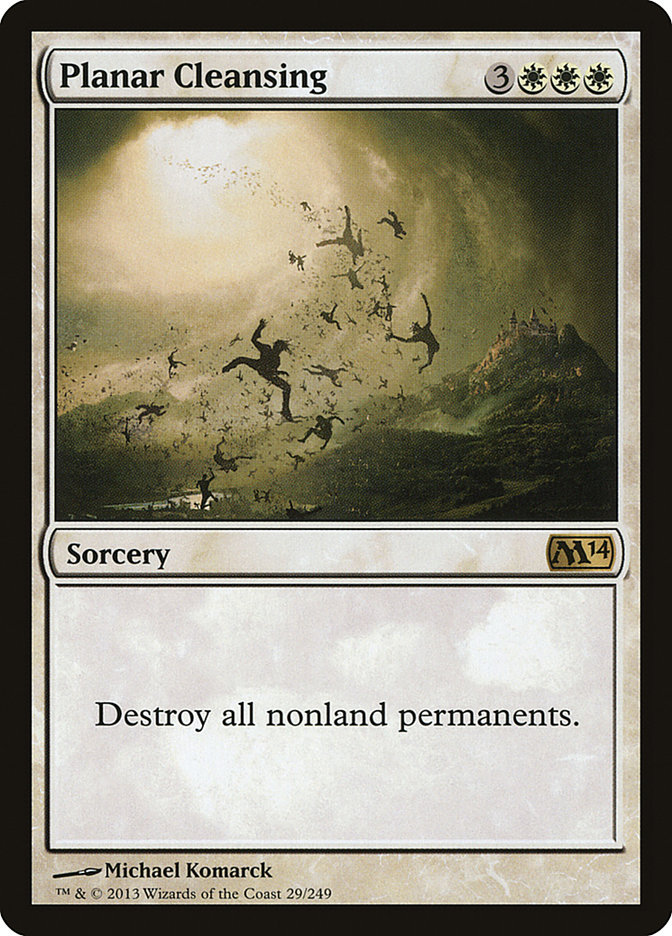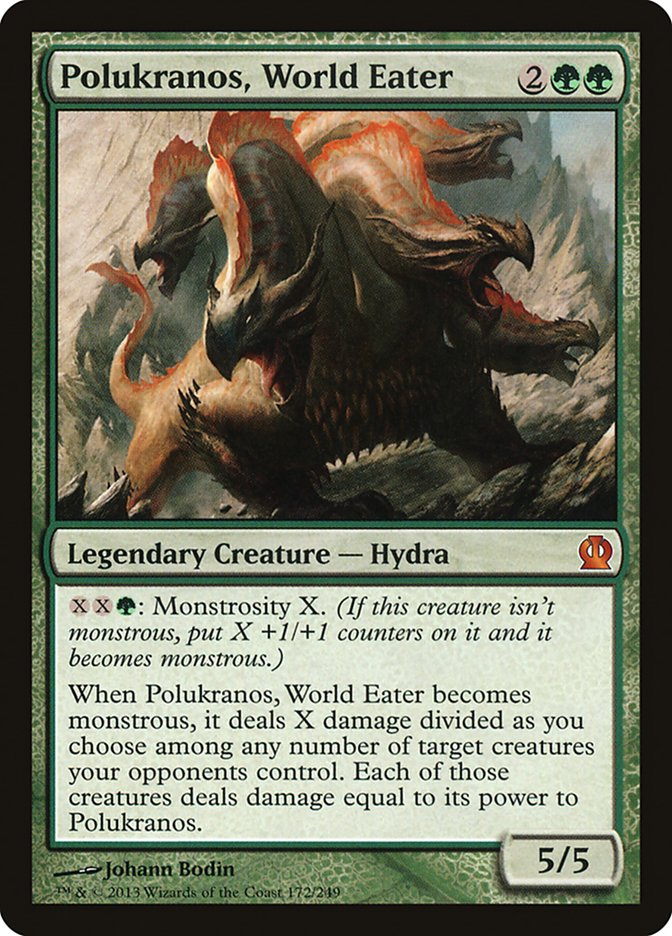After spending a couple weeks in Dublin to prepare for and play in Pro Tour Theros, I arrived home late Monday evening. My plan was to fly to Chicago on Thursday morning and drive on Friday to Grand Prix Louisville with Owen Turtenwald. We’d be meeting up with Reid Duke and hanging out for a few days in Indiana after the Grand Prix until the StarCityGames.com Invitational the following weekend. Because I had been away from home for so long and was about to leave again, I had several errands to run and things to take care of. I knew I wouldn’t have much time to prepare for the Grand Prix, so I was going to have to make my preparation count.
If the Pro Tour was indicative of the metagame for the Grand Prix, which I expected it to be, it seemed like control decks were in a very good position to do well. The Mono-Blue Devotion deck that Team Revolution took to first and second place at the Pro Tour and that was also played by my team, Team StarCityGames.com, and put Sam Black into Top 8 seemed like it would be a huge part of the field.
I discussed the metagame with several friends, and in addition to Blue Devotion people expected plenty of Black and Green Devotion decks as well. Everybody seemed to think that Sphinx’s Revelation based control decks would make a post-Pro Tour resurgence. Certainly there would be a fair amount of black midrange decks similar to Patrick Chapin deck from the Pro Tour too. A lot of people whose opinions I respect seemed to think Esper Control was the best choice for the Grand Prix. In particular, Reid Duke, Josh Utter-Leyton, Eric Froehlich, and Shahar Shenhar all told me they thought that Esper was the correct deck choice for the tournament.
I really enjoyed playing the Mono-Blue Devotion deck at the Pro Tour, and I had good results with it. I really wanted to play it again and was planning to look for any reason at all to do so. I felt comfortable with it because of my preparation for the Pro Tour, so I decided to spend the time I had practicing with Esper Control. This way I could figure out if I liked the deck versus the various decks I expected to face at the Grand Prix as well as get some experience with it. If I decided that I didn’t want to play it, I knew I had the Blue Devotion deck to fall back on.
After two days of playing Esper Control on Magic Online, I headed to the airport to begin my trek to Louisville. I arrived in Chicago Thursday afternoon, and Owen and I left on Friday morning. Neither of us really had a deck locked in when we left for Louisville. When it was my turn to drive, Owen spent a fair amount of time looking through Magic Online Daily Event results and came across a variation on the Mono-Blue Devotion deck that played four copies of Nykthos, Shrine to Nyx and four copies of Cyclonic Rift in addition to some other changes. We discussed this deck for quite a while and were even considering playing it when we arrived in Louisville.
We went to the site to register and met up with Sam Black. Sam was planning to play B/W Midrange at the time. After we told him about the four Nykthos blue deck, he was somewhat interested. Eventually, after we had put the deck together and taken some test draws, we kept making changes that moved the deck toward what we had all played at the Pro Tour. As much as I wanted to play the Blue Devotion deck, I was too scared it would be overly hated because it was so successful at the Pro Tour. Despite having it sleeved and registered, at the last minute I decided to play Esper Control. But my flirtations with the Blue Devotion deck were not all for naught, as they were partly responsible for Sam playing the deck to a Top 8 finish in Louisville, fresh off his Top 8 at Pro Tour Theros the weekend earlier.
Here is the Esper Control list I ultimately settled on, which was designed by Reid Duke:
Creatures (1)
Planeswalkers (6)
Lands (20)
Spells (33)

I expected to have a good matchup versus the Green Devotion deck, to have a decent matchup against the Blue Devotion deck, and probably be a small underdog versus the Black Devotion deck and the B/W Midrange deck. I liked the fact that everyone was expecting so much control. I both enjoy control mirrors very much and am very confident in my ability to play them well. Grand Prix also tend to have a fair amount of rogue strategies against which control decks tend to do especially well.
Here are what I felt are among the most interesting matches I played in the tournament.
Round 5: Justin Herrell with W/R Aggro (4-0)
Game 1
I lost the die roll, and Justin chose to play. This would be very important since he had a lightning-fast draw. Turn 1 Soldier of the Pantheon into turn 2 double Dryad Militant and I was on the ropes very quickly. I was able to Doom Blade the Soldier of the Pantheon on my second turn, but Justin followed that up with Mutavault and a Spear of Heliod. If I had been able to play a Detention Sphere on my third turn to remove both of the Dryad Militants, I might have actually had a shot this game, but I was unable to. Two 3/2 Dryad Militants and a 3/3 Mutavault made quick work of me, and we headed to game 2.
Game 2
In game 2, I mulliganed to six, but Justin mulliganed to five. I ended up dealing with his first couple creatures with direct removal spells. Then I was able to Divination into Azorius Charm to put his attacker back on top of his deck and follow that up with a Sphinx’s Revelation for four. Justin was never really able to overcome the mulligan to five, and I ended up winning this game fairly easily.
Game 3
Like game 1, game 3 was not particularly close. Justin was able to get a Dryad Militant and a Daring Skyjek on the board and protect the Skyjek from my Doom Blade using Brave the Elements. Then, when I went for Supreme Verdict on turn 4, he was able to protect all his creatures using Boros Charm. The rest was academic, as those two creatures plus a pair of Mutavaults were too much for me to protect myself from.
Round 13: Jack Fogle with Esper Control (10-2)
I was 10-2 at this point, but Jack was actually 11-1.
Game 1
Game 1 of this match was the longest and most interesting game I played in the tournament. Jack and I spent many turns of the match developing our mana bases, trading Jace, Architect of Thought for Hero’s Downfall, and getting deeper into our decks. Both of us were able to resolve Sphinx’s Revelations for several cards. When we were about halfway through our libraries, I had two Detention Spheres—one with Jace, Architect of Thought under it and another with Elspeth, Sun’s Champion under it. Supreme Verdict had been able to deal with the tokens created by Elspeth.
I knew that most players don’t play more than three or four counterspells in Esper, so I was very careful to make sure that I would always be able to fight over Aetherling, be it mine or Jack’s. Aetherling is the most potent threat in the Esper mirror by far, but most people only have one. Jack was playing Syncopate in his deck, so it was possible he had more counterspells than I did. About halfway through the game Jack played Planar Cleansing. This was quite a threat, as it was going to kill my two Detention Spheres and release both his Jace and his Elspeth. I spent a Dissolve here because the threat of two planeswalkers was very potent. Jack fought over it, and I decided to save my last Dissolve and deal with the planeswalkers via other means.
I believe the key point of the match was when I allowed Jack to resolve a Sphinx’s Revelation for six or seven. I had Dissolve in hand, but I was also holding my Aetherling. Jack had already used four counters, and I wasn’t sure exactly how many he played. I thought it could be only four or perhaps five, in which case I might be able to resolve my Aetherling. Jack had spent many of his counters on my Sphinx’s Revelations, so I was hoping he didn’t have too many left. My strategy ended up working out, as I was able to resolve an Aetherling without much of a fight. I still had my one Dissolve left too in case something went awry.
With five cards left in my library, I had Aetherling, Elspeth, and a ton of lands. Jack had a ton of a lands and a Jace. I was in danger of being decked if he was able to Fog Aetherling enough times or if I was forced to attack Jace too often. Because I had two spells left in my library, I decided to finish off Jace and try to win with Elspeth and Aetherling over my next four turns. Jack was able to follow it up with another Jace, which meant he could plus it to keep my Elspeth tokens from dealing any damage.
I would be able to ultimate Elspeth with two cards left in my library, and he would be able to ultimate his Jace with one card left in my library. I knew he had two copies of Supreme Verdict left in his deck, so I didn’t want to be too reliant on the Elspeth emblem, but I also needed to make sure I could finish him off. I also had to make sure that I wouldn’t get decked by losing a card to the Jace, Architect of Thought ultimate.
I was attacking Jack directly instead of Jace since I could decide to attack Jace later depending on whether or not I was able to figure out if the last card in my library would be a land. This was relevant because if it was in fact a land, the Jace ultimate couldn’t take it out of my library. Jack had a lot of spot removal in his graveyard, and it was likely all his Azorius Charms were gone. When I drew the 57th card of my library, leaving me with three, I counted the lands I had in play, hand, and graveyard and realized that my last three cards were all lands. This meant I didn’t have to worry at all about Jace.
I put Elspeth to seven loyalty with two cards left in my library. Jack was able to cast Supreme Verdict on his turn, which was his third. So on my second-to-last turn in terms of library count, I ultimated my Elspeth, attacked with Aetherling, and thanks to the Elspeth emblem pumped it six times. Because of the Jace trigger, Jack “only” took eleven damage, putting him to eight life. Jack untapped, ultimated his Jace, and conceded upon seeing my last card was a land and I wouldn’t get decked.
Game 2
Game 1 had taken about forty minutes, so we both sideboarded very quickly for game 2. Jack decided to board into a deck that was about as aggressive as he could muster in order to give himself a chance to win two games with the time remaining, which is a very reasonably strategy. I probably would’ve done something similar if I’d lost the first game.
Jack managed to start things out with a turn 1 Soldier of the Pantheon, but my turn 3 Ashiok, Nightmare Weaver slowed him down a little bit. I was also very fortunate that even after being targeted by two copies of Thoughtseize before my fifth turn that I was able to play a Blood Baron of Vizkopa that went unanswered and ultimately won me the game. Jack played this match well, and who knows what would’ve happened if we’d had unlimited time and he wasn’t forced to take lines as aggressive as he did in order to give himself a chance to win the match.
Round 14: Tyler Winn with Mono-Blue Devotion (11-2)
Game 1
As the Mono-Blue Devotion deck aims to do, Tyler started off with a reasonably fast draw in game 1. I was able to Detention Sphere his Thassa, God of the Sea on turn 3 and follow it up with a Supreme Verdict on turn 4. He laid down two more creatures, and I was able to follow that up with yet another Supreme Verdict. Another Thassa would be answered by another Detention Sphere, but I was still being pecked away at by a couple Mutavaults.
At five life with nine lands in play, I was able to play Jace, Architect of Thought and tick it up. Mutavaults hit me and put me to three life. On the next turn I was able to cast Sphinx’s Revelation for seven cards and seven life, untap, and cast a third Supreme Verdict to eliminate the Nightveil Specter and Cloudfin Raptor that Tyler had added to the board that turn, and he conceded since the game was out of reach.
Game 2
In game 2, I was able to one-for-one Tyler’s early threats with Doom Blade and Gainsay. On his fourth turn he played Jace, Architect of Thought and used the -2 ability. He revealed Island, Island, and Tidebinder Mage. I decided to split land versus spells, as I had no reason not to at this point. He took the spell. On the following turn, before doing anything, Tyler used the minus ability on his Jace again. I thought this was very telling. The only reason for him to do this and lose his Jace against a control deck was if he had another Jace or wanted to hit a land drop. The split revealed Cloudfin Raptor, Island, and Judge’s Familiar. I decided to go with my read and split the piles as Island against the other two. This time he took Island and added another couple creatures to the board.
I played Supreme Verdict on the following turn, but he was able to continue to develop his board. Tyler had started to talk through a lot of his plays aloud, which was really playing to my advantage. I was able to get Elspeth, Sun’s Champion into play and use another Gainsay to keep Thassa off the table so that I could protect my Elspeth from his nonflying creatures. Jace had been in play and kept being added so his fliers weren’t able to profitably attack Elspeth. After getting an army of tokens into play, I ultimated Elspeth. When I followed that up with a Sphinx’s Revelation for seven, it was enough for Tyler since the rest was academic. He conceded, and I went to 12-2. I was anxious for the standings to go up to see if I’d be able to draw into Top 8.
Round 15: Todd Anderson with Mono-Black Devotion (12-2)
After studying the standings it appeared to me I was at some risk if I drew of finishing in exactly ninth place. I was still likely to finish eighth, but I didn’t want to lose and feel stupid for squandering my chance to make my tenth Grand Prix Top 8. I expected the first two tables to draw. This meant if I drew and Alex Sittner won his match, there would be three people at 38 points, two at 39 points, and four people at 37 points. Eighth place versus ninth place would come down to me against Alex. Our tiebreakers were absurdly close going into the round, and I just didn’t want to risk it. It was extremely unlikely for me to pass either Todd or Brian Braun-Duin on tiebreakers.
Todd was certainly a lock for Top 8 with a draw and was also unqualified for Pro Tour Born of the Gods. I really like Todd and wish things had been simpler, but unfortunately I thought it was in my best interest to try to win the match.
Game 1
Todd had a turn 2 Pack Rat. I was able to Detention Sphere it after he made one copy. Unfortunately, Todd was able to get Erebos into play, and I had no answer to it. He was able to use Erebos to draw into multiple copies of Thoughtseize, strip my hand, and overwhelm me with Mutavaults and Grey Merchant of Asphodel. I didn’t really have much to interact. I got Aetherling into play, but it didn’t really accomplish much since I died to his horde the following turn.
At this point, knowing that after sideboard I didn’t have a great matchup and I’d have to win two games in a row against a great player, I offered the draw again. I figured even if I was fifty percent to make Top 8 at this point it was still more likely than winning two post-sideboarded games in a bad matchup against a great player. Todd naturally accepted since he’d be guaranteed a Top 8 slot and have the chance to qualify for the Pro Tour.
We signed the slip, and I began to impatiently wait to find out if I’d make Top 8. While I was waiting I found out that Sam Black had actually decided to play for seeding rather than draw with his opponent since he thought that they’d both make Top 8 anyway. Unfortunately for his opponent, this would turn out to be incorrect because his tiebreakers weren’t the greatest, and he ended up finishing ninth.
I actually got the seventh seed, which I was especially happy with since it meant I got to avoid playing friend and teammate Sam Black in the first round of Top 8. However, I was still going to be forced to face another great player in Jon Stern.
Top 8: Jon Stern with G/R Monsters
Game 1
Jon had the higher seed, so he was on the play for game 1. This would prove to be very effective, as he began with the perfect turn 1 play of Forest, Elvish Mystic. On Jon’s second turn he played a land and didn’t attack with Elvish Mystic. This made it quite clear that his plan was to flash in a Boon Satyr at the end of my turn. I played a shock land untapped, and as expected he played a Boon Satyr. I was able to use Azorius Charm to put it on top of his deck and preserve my life total.
Jon was able to resolve a Domri Rade and start ticking it up. I had a Hero’s Downfall to answer it, but unfortunately he had another Domri to replace it and started ticking that one up as well. Jon was able to use his card advantage from Domri and Stormbreath Dragon to force me to cast Supreme Verdict twice. With Domri at six counters, Jon played an Elvish Mystic and Bestowed a Boon Satyr onto it.
I played a basic Island and was going to be able to cast Sphinx’s Revelation for four. I was at eight life. My hope was that I could Revelation into an answer to both Domri and the Booned Elvish Mystic. Jon ticked his Domri up to seven, which threatened ultimate on the following turn. Unfortunately for me, Domri revealed a Stormbreath Dragon. This meant that Jon had essentially three threats that I needed to deal with the following turn or be all but hopeless to win.
I drew a Supreme Verdict for my draw step and cast it. Unfortunately, I couldn’t both Hero’s Downfall Domri and deal with a potentially lethal boon Satyr, so I was forced to just pass the turn. Jon ultimated his Domri, and I played Doom Blade on the Satyr in response. Jon played a useless-looking Sylvan Caryatid and passed the turn. The Caryatid ended up not being useless at all, as I drew a Far // Away for my draw phase. Away would have been an extremely powerful tool against Jon’s hexproof creatures, but the Caryatid completely negated it. What I did have going for me was that Jon clearly had no threats in his hand. However, I had no counterspells and no Sphinx’s Revelation. I untapped, played an Aetherling, and passed the turn. Jon bricked again, and I felt like I had a glimmer of hope to win the game.
I attacked with Aetherling, hoping Jon would block with the Caryatid, but he saw what I was up to and didn’t block. My decision for what to do this turn was interesting. I could blink Aetherling and pass with a ton of mana up, or I could cast Divination and see what developed. I decided to cast Divination and hope to find a counterspell. I drew a second Divination and cast that as well. Then I played my land for the turn and played Jace, Architect of Thought. I used the minus ability in order to try to get to something that could interact with the top of Jon’s deck.
My logic here was that I had to win fast. I also thought it was very likely that Jon had a Mizzium Mortars in his hand. This means that I’m dead to Polukranos, Stormbreath Dragon, and Scavenging Ooze anyway. If I’m right about the Mortars, having an untapped Aetherling with a bunch of mana only helps against the Krosan Tusker. Also, if I leave everything up, he plays a creature and does not have Mortars, and I spend all my mana every turn just to pump Aetherling’s defense to stay alive, what good does that really do me in the long run? If I’m able to get to Dissolve and Jon bricks one more time, I win the game. I thought this was the best approach. The top card of Jon’s deck?
Game 2
Game 2 was pretty uneventful. I kept a questionable hand of Temple of Deceit, Watery Grave, Island, Supreme Verdict, Sphinx’s Revelation, Negate, and Aetherling. I had no white mana, but I had the Negate for Jon’s planeswalkers and the Supreme Verdict, which I hoped I could cast by using my scry land to find white mana. Ultimately, I died with only one white mana in play to a swarm of Jon’s creatures. I discussed my hand with Jon after the game, and he thought he would have kept as well. It’s easy to second guess yourself when you make close decisions like this, especially when they go badly. I’m not sure if it was the right call, but I’m not unhappy with my decision. I was able to Negate a Domri Rade, and if Jon’s curve had been a little higher, things might have gone differently.
I ended up finishing eighth, which is a great finish by any metric, but it’s always a letdown to get so close and come up short.
Huge congratulations to Sam Black on making Top 8 of a Grand Prix just a week after his second Pro Tour Top 8 in Dublin. Congratulations also to Todd Anderson, Brad Nelson, and Brian Braun-Duin on dismantling the tournament with Mono-Black Devotion. And lastly, an especially large congratulations to Brian for winning his first Grand Prix and qualifying for Pro Tour Born of the Gods. It couldn’t have happened to a nicer guy.




